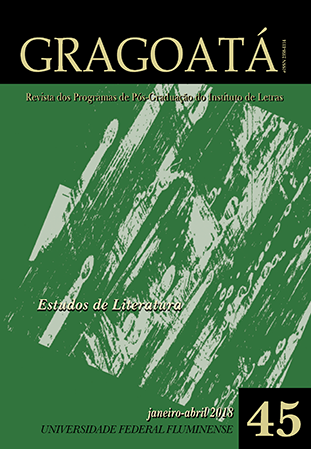“We chose liberty!” – democracy and moral responsibility in 'The Plot Against America', by Phillip Roth
DOI:
https://doi.org/10.22409/gragoata.v23i45.33564Keywords:
North American Literature, Politics, History.Abstract
The novel The Plot Against America (2004), from the contemporary north-American writer Philip Roth, is studied here from the relations between the democratic ideals established by the oficial discourse on America as a nation and its fundamental values of equality and individual freedom as comprehended inside a jewish and poor Family of Newark in the 1940’s beginnings in a time of instability imagined by the novelist through the construction of a “contrafactualchronotope” (cf. ANDRADE; SANTOS, 2013) asking what could have happened to the americanjews if Roosevelt have lost the 1940’s elections. The hypothesis is conducted by Jacques Rancière, in the sense he proposes the analyzis of the term democracy, wich has been perverted by people of most various ideological positions, what is confirmed by Roth in the mentioned novel. We also try to recognize the contribution of Roland Barthes to the questions of Literature and Politics, among other authors. The moral responsibility theme has been approached in a way to pick up the ethos of the main characters face to the changes provoked by the frightful circumstances presented by fiction in a close link to the writer’s ethic and aesthetic Project.
---
Downloads
Downloads
Published
How to Cite
Issue
Section
License
Authors who publish in Gragoatá agree to the following terms:
The authors retain the rights and give the journal the right to the first publication, simultaneously subject to a Creative Commons license CC-BY-NC 4.0, which allows sharing by third parties with due mention to the author and the first publication by Gragoatá.
Authors may enter into additional and separate contractual arrangements for the non-exclusive distribution of the published version of the work (for example, posting it in an institutional repository or publishing it in a book), with recognition of its initial publication in Gragoatá.

Gragoatá is licensed under a Creative Commons - Attribution-NonCommercial 4.0 International.














